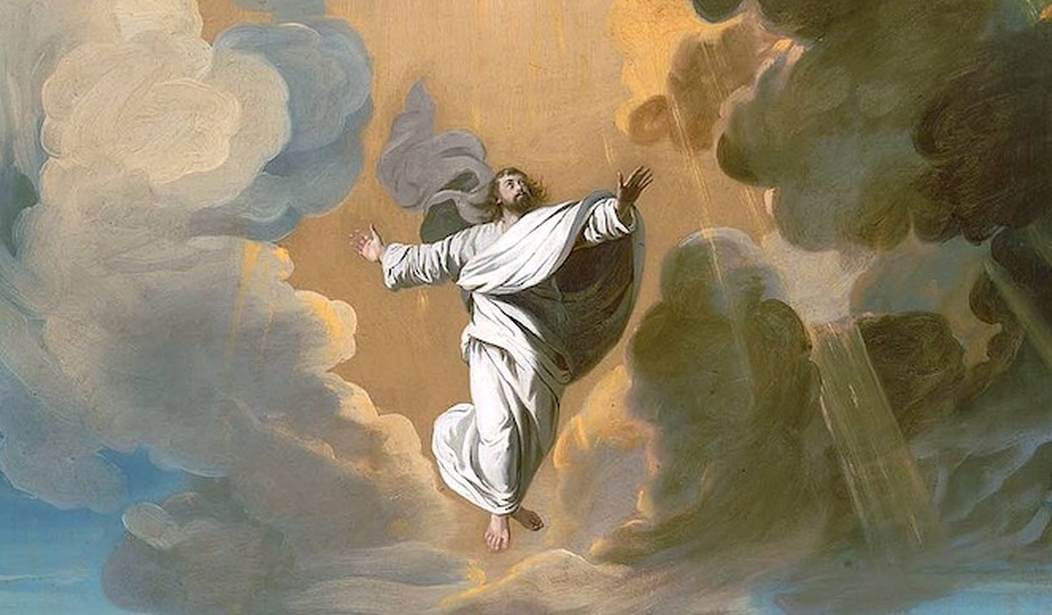Today’s Gospel reading for the Ascension is Matthew 28:16-20:
The eleven disciples went to Galilee, to the mountain to which Jesus had ordered them. When they saw him, they worshiped, but they doubted. Then Jesus approached and said to them, “All power in heaven and on earth has been given to me. Go, therefore, and make disciples of all nations, baptizing them in the name of the Father, and of the Son, and of the Holy Spirit, teaching them to observe all that I have commanded you. And behold, I am with you always, until the end of the age.”
Our first reading is from Acts of the Apostles, 1:1-11:
In the first book, Theophilus, I dealt with all that Jesus did and taught until the day he was taken up, after giving instructions through the Holy Spirit to the apostles whom he had chosen. He presented himself alive to them by many proofs after he had suffered, appearing to them during forty days and speaking about the kingdom of God. While meeting with them, he enjoined them not to depart from Jerusalem, but to wait for “the promise of the Father about which you have heard me speak; for John baptized with water, but in a few days you will be baptized with the Holy Spirit.”
When they had gathered together they asked him, “Lord, are you at this time going to restore the kingdom to Israel?” He answered them, “It is not for you to know the times or seasons that the Father has established by his own authority. But you will receive power when the Holy Spirit comes upon you, and you will be my witnesses in Jerusalem, throughout Judea and Samaria, and to the ends of the earth.” When he had said this, as they were looking on, he was lifted up, and a cloud took him from their sight. While they were looking intently at the sky as he was going, suddenly two men dressed in white garments stood beside them. They said, “Men of Galilee, why are you standing there looking at the sky? This Jesus who has been taken up from you into heaven will return in the same way as you have seen him going into heaven.”
How often have we asked a form of the question in the headline? When I worked in retail, I’d get that question asked of me fairly: “Are you on commission?” Most times, the intent was to respect my work and ensure that I got a sale; occasionally it was meant more suspiciously, as though a commissioned salesperson might have ulterior motives. And maybe that’s the case, although I’ve never worked in retail at any level — even in fast food — where management didn’t press its sales workers to upsell, regardless of whether we got a commission. “You want fries with that?” is the classic upsell technique.
Plus, of course, we preferred that the store stay in business, no matter what compensation arrangements we had. (Theoretically, anyway, although I can’t guarantee I thought that in every instance.)
Today we remember the Ascension of Jesus at the end of the Gospel of Matthew and His Great Commission: Go, therefore, and make disciples of all nations. Jesus called each of His disciples to this commission, and calls every Christian to it to this day.
And so we ask ourselves: Are we on commission?
This is not an easy question, and it has multiple angles. First, the literal: how often do we proselytize for the faith, in sincerity? When we do, are we fully committed to it — and how does that come across? In my not-terribly-expert experience, it generates similar reactions to selling goods and services. There may be interest in the faith being proclaimed, but a healthy bit of skepticism too — not just of the faith but of the motives behind the proselytization.
For one thing, they just may not believe we mean it. Are our own hearts into the effort? Perhaps even more to the point, do we model the faith we are preaching? To put it back into terms of my youth, it’s tough to sell a Hart Schaffner & Marx tailored suit and Johnston & Murphy brogues as essential making-of-the-man wardrobe when you’re wearing off-the-rack Sears matchables with sneakers. (Welcome to my first week of sales in 1981.)
But hypocrisy is only one issue. Another is the impression that often comes across, fairly or not, that the preaching really isn’t intended to engage at all, but to serve our own egos and sense of righteousness. Jesus went to the sinners and preached, but He also loved them enough to know their lives and to find the hurts and the gaps that His love could fill. He healed the infirm and the sick as signs, but also because of His love for them individually and specifically.
In the Great Commission and in the passages in Acts 1, Jesus confers His power to the apostles at Pentecost to do the same. However, He commands us to do so through love rather than through authority and dominion, even if we can claim either or both. The agape/caritas love of the Trinity orients itself to the good of the other over ourselves, and if that element is missing from our efforts to make disciples of all nations, we become — as Paul wrote in Corinthians — we become “only a resounding gong or a clanging cymbal.” Or worse, we become salesmen looking to sell for ourselves to earn the other kind of commission. It becomes about us rather than about others.
The question in the headline leads to another question, too. If we are “on commission” in the prophetic sense, just what is that commission? Do we grasp its scope, and its necessity?
It’s far too long to include here, but Chad Pecknold wrote a lengthy essay on this very question last month, a follow-on from a March speech he gave at the Pontifical College Josephinum in Columbus, Ohio. Professor Pecknold argued that the Great Commission has become too Americanized in the last several decades and that Christians have entered into a fundamental misunderstanding of Jesus’ command.
Why does Jesus take his apostles to a mountaintop in order to tell them that all power has been given to Him, and then use that power to command and commission them, as Matthew tells us, to make disciples of all nations in the Name of the Father, Son and the Holy Spirit? Luke adds that they were “sent to all the nations” and for this task, Jesus gave them power over demons, with the presumption that they will need that power in order to exorcise the nations before baptizing them. Mark and John also speak of going to the nations, to the ends of the earth, being sent in the same manner as the Father sent the Son—that is, with the fullness of power. In the second Book of Acts we get the so-called List of Nations—indeed, many different nations are explicitly named at Pentecost.
Whatever modern historical-critical scholars make of these texts, the Church’s reception of the Latin Vulgate’s Ad Gentes, “go to the nations,” has historically not been esoteric but straightforward. Christ was sent by the Father into the world for the salvation of souls, but the Church’s missionary activity is primarily done holistically, in a communal way, involving the conversion of whole peoples and nations, just as we see in the Gospels themselves. Ad Gentes concerns the Church’s mission to convert societies, political communities, and language groups. This is the witness of all the great missionary saints: ours is a communal faith, which goes down from the mountaintop, to the nations, for the salvation of many.
Individual conversions to Christianity are still a key part of the Great Commission, but only one component. The real command from Jesus is to change the world and all communities to learn and obey the Word of God. It is not enough to settle for individual conversion; the Great Commission requires a cultural and communitarian conversion. That argument has a number of implications, especially in this country, which I’d encourage everyone to read in Pecknold’s essay at Postliberal Order.
But it brings us back to the question of the day: Are we still ‘on commission’? Are we working to inculcate or restore Christianity to the broader culture and make the Word our key values and priorities? Or are we nibbling at the edges, reluctant to make waves — or even worse, grown hopeless and faithless about that struggle to make disciples of all nations to the point where we’ve given up on ours?
That’s not an easy question to answer. But that is why Jesus sent us the Holy Spirit as the fire in our hearts, to find courage and renew our efforts to follow His mission to save the world. We already know the victory is His, so we can face whatever comes as we work in His name.
Addendum: I interviewed Professor Pecknold while guest-hosting on Relevant Radio last month. We discussed his essay for an entire hour, and it was one of the more interesting interviews I’ve done. You can listen to it and/or download it at this link.
The front-page image is a detail from “Ascension” by John Singleton Copley, 1775. Currently on display at the Museum of Fine Arts Boston. Via Wikimedia Commons.
“Sunday Reflection” is a regular feature, looking at the specific readings used in today’s Mass in Catholic parishes around the world. The reflection represents only my own point of view, intended to help prepare myself for the Lord’s day and perhaps spark a meaningful discussion. Previous Sunday Reflections from the main page can be found here.








Join the conversation as a VIP Member